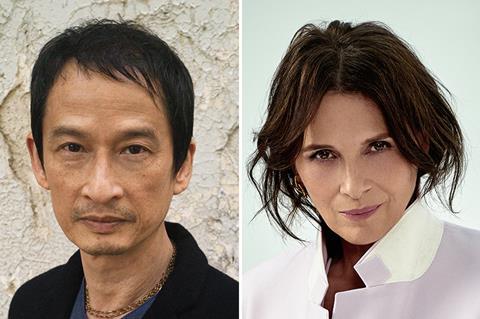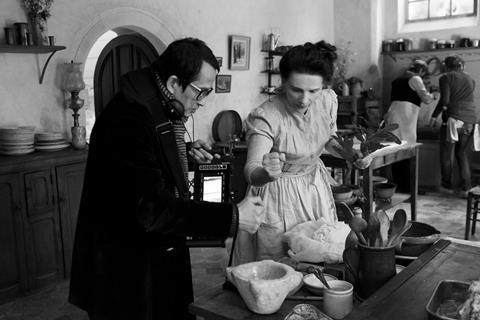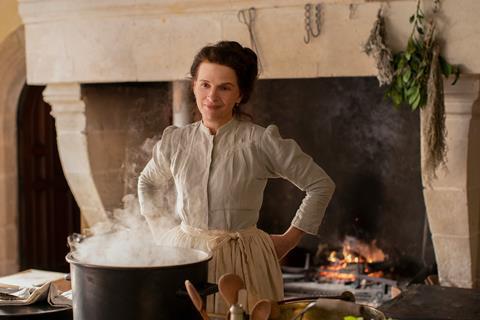
It is no small feat to steal the spotlight from Juliette Binoche, but the Oscar, Bafta and Cesar-winning actress is often upstaged in Tran Anh Hung’s sensuous romantic drama The Taste Of Things by the likes of carrots, cabbage, crayfish and a significant amount of cream.
The film, set in the French countryside in the late 19th century, sees Binoche play Eugenie, the diligent head cook for gourmet chef Dodin Bouffant, played by multiple Cesar-winning actor Benoît Magimel, her co-star in Diane Kurys’ 1999 film Children Of The Century and real-life
ex-romantic partner. The two soulmates and bowl mates share meals and a passion for preparing them together, but Eugenie refuses to marry, preferring her freedom and unconventional relationship instead.
Following a world premiere in Cannes, where it won Tran the best director prize, The Taste Of Things went on to screen at Telluride, New York, BFI London and Tokyo film festivals. The film’s culinary director is famed French chef Pierre Gagnaire, who designed the dishes that were all cooked on location by Michel Nave. The film, titled La Passion De Dodin Bouffant in France (and The Pot-Au-Feu for international markets, although they may use the US title if preferred), is France’s entry for the best international feature Oscar, and receives an awards-qualifying US release in December via IFC Films/Sapan Studio ahead of rollout in February, with Picturehouse Entertainment likewise releasing in the UK in February.

Screen International: What whet your appetite for telling a love story about gastronomy?
Tran Anh Hung: I’d been wanting to make a film about food and the art of cooking for a long time. I stumbled upon Marcel Rouff’s book [La France Gastronomique] and there were so many magnificent pages that talked about food. It gave me the idea to tell the story I wanted to tell — a love story about two people who had lived and worked together for several years.
Did you always have Juliette in mind for the role of Eugenie?
Tran: Juliette and I have the same agent and we once met and promised each other we’d make a film together one day. The role was perfect for her.
Juliette Binoche: When we first met, I saw your gentleness and your way of listening, which is rare. And when we talked, I was more and more convinced because the way you approach cinema is quite different to the western approach. The camera is like a paintbrush for you, like calligraphy. The way you stay fixed on one image to leave time to see and to feel things from the inside. Such a slowness brings a sense of relishing the moment, like when you taste food. You must let it melt in your mouth, chew it, let it sink in.
Tran: Long takes allow the actors to completely master the rhythm of the scene. It’s something that belongs to them completely. I have no control — I just put something into place and they bring musicality to the film.
Binoche: And as an actor, when the director cedes control, that’s when we can enjoy ourselves. Because we really feel we are free with no-one yelling “cut”.
Tran: The aim was to really be immersed in the daily life of Dodin and Eugenie.
Speaking of Dodin, played by Benoît Magimel — Juliette, what was it like to work with him so many years after Children Of The Century and your off-screen relationship?
Binoche: It’s been 25 years. I came into this with a bit of fear because the film is about a relationship, and we’ve been separated for many years and we had our ups and downs. I knew that cooking could bring us together and it did unite us, but it also caused quite a bit of friction in the beginning.
How so?
Binoche: We had one day of rehearsal and Benoît, who adores cooking, took it all upon himself to do everything. I told Hung that for audiences to believe that Dodin misses Eugenie when she is gone, he needed to make space for me in the kitchen from the very beginning. Benoît felt we’d ripped the rug out from under his feet, so we started off with a weight on our shoulders. The next day, when we were eating our omelette like we did every morning — just like Dodin and Eugenie in the film — I gave a huge hug and kiss to Benoît and we started our day that way, over an omelette, and everything went smoothly in the end.
Cooking did bring you together. The magic omelette.
Binoche: [laughs] Yes, the magic omelette!

You also co-star with cream, meat, butter and vegetables. How did you co-ordinate sharing screentime with these leading ingredients from a technical perspective?
Tran: I needed the actors to move in a way that felt true to life and was expressive on the screen. From the start, it all functioned perfectly. We had hand doubles, but in the final cut, there’s just one shot of hands to replace Juliette’s and one for Benoît — that’s it. They wanted to do everything themselves.
What did the preparation for the role entail? Did you take cooking classes?
Binoche: My cooking classes were my life experience. When you have children, you cook, and I like to entertain and invite family and friends. Sometimes, I cook out of necessity and other times to show off, either to test out something new or when I taste something I like, I want to take the recipe and make it at home to share it. The way Benoît and I move seems natural because we both really cook.
Tran: We didn’t spend too much time focused on the beauty of the dishes or over-the-top gestures that we often see in films and in cooking shows on TV. What was important was to see Eugenie and Dodin in action.
Is the culinary art timeless or was there research involved in replicating the cooking of the 19th century, when the film is set?
Binoche: The urgency of life, the urgency of eating — that passes through every century. There is a need for eating and for preparing food “with heart”, as Pierre Gagnaire likes to say. This transcends time. I didn’t even ask myself how I’d do it. The only question was, with all the dishes we had to make, I wondered how we would manage not to burn or cut ourselves.
Tran: That was a miracle. Over the entire filming, we didn’t break one object and no-one was injured.
How much food was used to prepare these elaborate meals?
Tran: We had 40 kilos of meat to make the pot-au-feu alone!
Binoche: Everything was eaten, nothing was wasted.
When you said “cut”, did everyone stop eating?
Tran: No, they continued to eat! Not Juliette — just the men. When I yelled “cut”, they kept eating. The assistants would say to me, “I need to take the plate to fill it again for the next take,” and the actors would say “wait!” and they’d continue to eat. Take after take, they ate and ate and the costume designers had to remove buttons so they could fit into their clothes.
What was your favourite dish in the film?
Tran: It was the turbot. There is such softness in its texture and the hollandaise sauce is exceptional.
Binoche: The vol-au-vent was extraordinary, but I didn’t even get to taste it. The first soup I ate with all the little vegetables and flowers was so incredible, I made it at home. It really impresses a crowd [laughs]. The dessert with the pear was incredible — it was like a Rodin sculpture.
The dishes are all classically French, much like the film itself. How does it feel to represent France in the Oscars?
Binoche: What is moving for me is that Hung, who is Vietnamese, really put French refinement on a pedestal. It’s about the art of cooking, about beauty and a way of filming that evokes emotion, but at the same time, there is some criticism. It’s all very anti-vegan — we are killing animals without any afterthought, taking and consuming, and what do we get in return? Pleasure. It’s provocative and I think today it’s impossible to make a film without being provocative in some way or another — either it provokes us internally or externally, but it forces us to question things for ourselves.






![The Brightest SunScreen[Courtesy HKIFF]](https://d1nslcd7m2225b.cloudfront.net/Pictures/274x183/3/5/0/1448350_thebrightestsunscreencourtesyhkiff_312678.jpg)


















No comments yet